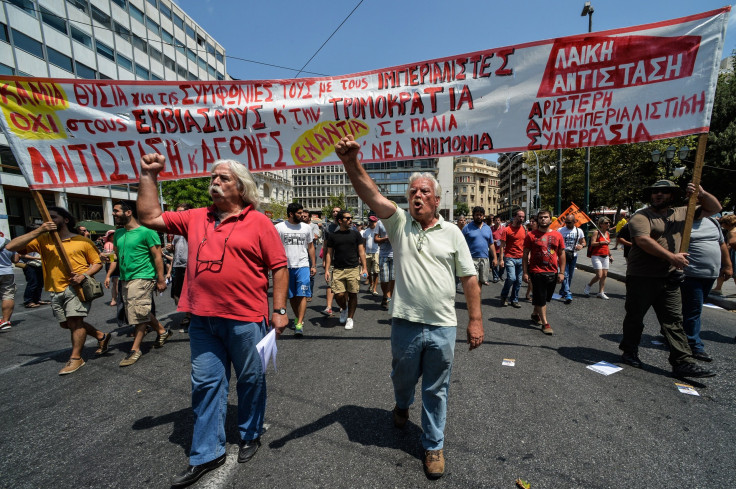Greek Debt Crisis: Parliament To Vote On Bailout Deal Amid Domestic Revolt, IMF Criticism

Greek lawmakers are preparing to vote Wednesday on a raft of contentious reforms that the country needs to implement in order to qualify for a third bailout worth as much as $95 billion. Greek Prime Minister Alexis Tsipras now faces the unenviable task of defending harsh economic measures he has already described as “irrational.”
If the parliament does not approve the deal -- an eventuality that seems increasingly likely following an International Monetary Fund (IMF) statement calling for more debt relief for Greece -- the country would fail to qualify for its third bailout package, pushing it yet again to the brink of bankruptcy. The measures, finalized Monday after night-long negotiations between Greece and its creditors in Brussels, include painful tax hikes, pension cuts and the privatization of several state-owned assets.
Failure to approve the plan would also jeopardize the 7 billion euro ($7.7 billion) bridge-financing loan to Greece for the month of July proposed by the European Commission on Wednesday. Additionally, it would also cast doubts over whether the European Central Bank -- which has been keeping Greek banks afloat with emergency liquidity, and has hinted that it would be willing to provide them more assistance before the deal is signed -- would continue to support Greek lenders.
In its debt-sustainability analysis released Tuesday, IMF said that Greece’s “highly-unsustainable” debt called for “deep upfront haircuts [reduction of Greeks debts]” or a drastic extension in the maturity of its debts.
“Greece’s debt can now only be made sustainable through debt relief measures that go far beyond what Europe has been willing to consider so far,” IMF said, in its report. “If Europe prefers to again provide debt relief through maturity extension, there would have to be a very dramatic extension with grace periods of, say, 30 years on the entire stock of European debt, including new assistance.”
Greece currently owes about 10 percent of its debt to the IMF and has already missed a deadline to repay a 1.5 billion euro loan to the institution, becoming the first advanced nation to default on an IMF loan.
Given that Greece’s European creditors, especially Germany, have ruled out reducing Greece’s debt burden, the IMF’s stance signals a split that would make Tsipras’ job of defending the deal in parliament much harder. Already, hard-liners within Tsipras’ leftist Syriza party and many of his cabinet members have revolted against the creditors’ demands, according to media reports.
“The deal is unacceptable,” Energy Minister Panagiotis Lafazanis, who belongs to the Syriza party, reportedly said on Tuesday. “It may pass through Parliament ... but the people will never accept it and will be united in their fight against it.”
© Copyright IBTimes 2025. All rights reserved.






















